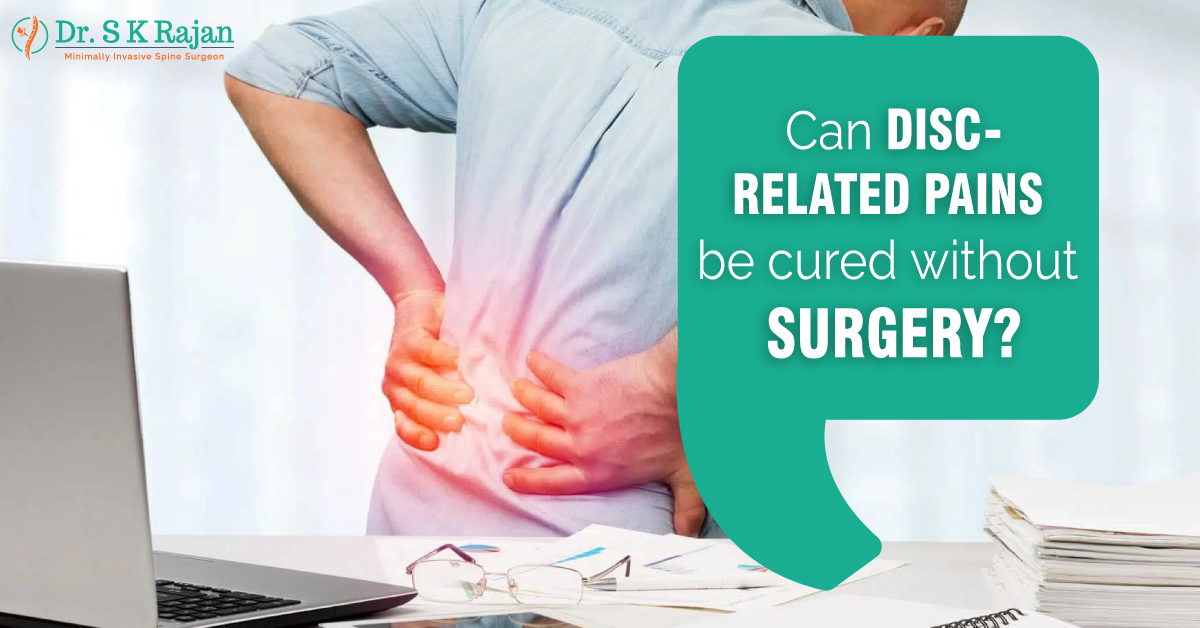
The medical term for a torn or slipped intervertebral disc is "slipped disc" or just "disc." A slipped or herniated disc often happens in the lower back, but it can sometimes go up to the sacrum. There is treatment for slipped disc, to get rid from it.
The discs between the vertebrae act as cushions between them. This help absorbs and spread out stresses on the spine and gives the spinal column room to move.
Vertebrae are the bones that make up the spinal column. Each disc is a joint of two flat, C-shaped parts called the "fibrous ring" and the "nucleus pulposus." The nucleus makes the disc flexible, and the fibrous ring keeps it in place.
The disc acts as a shock absorber and helps spread the body's weight across the space between each vertebra. The spine can also bend because of the discs. And keep it from being stuck in an entirely straight or fully bent position. A normal spine should be able to move in three ways. These are shaking from side to side, bending up and down, and rocking forward and back like when you walk.
A slipped disc can also be called a "slipped" or "herniated" disc, a "bulging" disc, etc. Most falls are caused by wear and tear that comes with getting older. This happens because cells lose water, which makes them stiffer and less able to move. When water loss occurs. The part of the disc that is soft and jelly-like in the middle sticks out past the more solid part. Annulus Fibrosus is the name for the top layer.
Slipped discs are most often caused by heavy lifting or hard work. Sometimes it's because of being too fat. When a disc slips, there is a chance that another injury will happen, like spondylolisthesis. When these people need the proper care in time, a slipped disc or herniation occurs when one of the fibrocartilaginous rings that hold the nucleus in place pushes through the vertebral endplates, which are weak spots in the bone and tissue around the disc. The ligaments around it are more likely to break than the annulus, which is made of solid fibres. This causes a condition known as a "Herniated or Slipped Disc." Several things can cause the disc to slip. Some of these are lifting the wrong way, twisting the back, and straining.
Slipping can cause damage to the body that can put pressure on the nerve roots. Nerve roots around it cause it to swell and inflame, hurting it. This is called a "slipped", "herniated", or "bulging" disc. Most people with slipped discs start to feel sick between 4 and 6 weeks after the slip.
Some doctors didn't want you to know that complication after surgery and failed slipped disc surgeries happen more often than you might think. Aside from problems and mistakes during surgery, many people find life hard after spine surgery.
Almost everyone who has micro surgery for slipped disc on their spine has to deal with some stiffness, discomfort, pain, or paresthesias (numbness and tingling). The number of successful spine surgeries is much lower than most surgeons would have you believe.
Some people with a slipped disc think surgery is the only way to fix it. But back surgery is not a cure for a slipped disc.
Everyone has a different body, but everyone can benefit from physical therapy because its only goal is to help the body move and be comfortable in gravity.
In the past, people who had a slipped disc were told to stay in bed and use ice. That was the norm for a long time, but new research and our patients' experiences show that targeted activity is better for this condition. Resting in one position can worsen things because it weakens the muscles that your spine needs to work.
Also, relaxation techniques loosen and stretch muscles that aren't commonly used for slip disc treatment without surgery. This lets other muscles relieve pressure on the muscles around the herniated disc.
Relaxing and meditating are also good for your mind. Pain is easier to deal with if you have a better idea of what's going on and how the treatment will work. We never want you to feel like you have to take painkillers that are hard to get off or risky surgery to stop the pain. Those choices should always be the last ones left.
Sometimes the pain is so bad that lying down or sitting in a chair, bed, or recliner in the right way is one of the only ways to stop hurting and let the muscles go that are pulling on the slipped disc. But remember that you will need a good PT routine to heal and strengthen the muscles that help you stand, walk, and move.